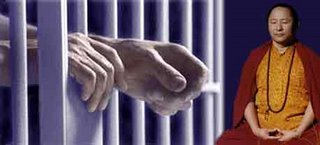 By MARIA SUDEKUM FISHER,
By MARIA SUDEKUM FISHER,Associated Press, Nov 24, 2006
NEWTON, Kansas (USA) -- Tony Farnan's back tells a story. "White Trash" is tattooed across the lower portion. A handcuffed, clenched fist with lightning bolts and a swastika takes up much of the middle. Farnan got the tattoos when he was younger, doing drugs, picking fights and living up to his identity as a pretty rough racist.
But now "White Trash" is covered up with another tattoo, a large purple lotus blossom. The clenched fist has been turned into a great big foo dog, the mythical Chinese protector of sacred places. If you look hard enough, you can make out the fist. But you have to know it's there.
He now takes care of his 95-year-old grandfather at their farmhouse outside Newton. He has sworn off drugs, violence and anything else that helped land him in jail. He's no longer racist.Farnan owes this new life to a discovery he made in prison.
"Buddhism has basically saved my life," Farnan says.
Farnan is one of a growing number of people who have discovered Buddhism while behind bars, thanks in part to the popularity of the religion nationwide and to the scores of Buddhist volunteers heading into prisons to tend to inmates, male and female, who were raised Buddhist or those who discovered the ancient religion later.
Several organizations nationwide now serve Buddhist inmates. The Prison Dharma Network in Boulder, Colo., gives yoga and meditation classes to inmates and also sends books and correspondence to prisoners across the country. The Buddhist Peace Fellowship in Berkeley, Calif., has meditation, yoga, and journal writing programs in several California prisons. The National Buddhist Prison Sangha in Mt. Tremper, N.Y., has been supporting prison inmates with visits and letters since 1984.
He [Farnan] got books on Buddhism, which gave him some guidelines. But months later after he had been sent to the Norton Correctional Facility, Farnan needed a teacher. He looked for a Buddhist session - or callout as it is referred to in prison. Norton didn't have one, so Farnan got by with his books and meditation.
Then he was moved to the Lansing Correctional Facility, where a Buddhist group had been meeting regularly.
"I wasn't looking for a religion. I was looking for some direction and something that could help guide me."
The callouts helped. But for the most part Farnan did "a lot of deep meditation and thinking," trying to keep things simple.
"I don't know, it was probably 2002, early 2003, when I really understood that compassion was kind of the answer.
He started curbing his impulses, too. If another inmate was playing music too loud, the old Farnan would have gone over, picked up the radio and smashed it.
"Now I realized that everyone is suffering, and he's probably playing the music loud to ease his suffering. I still might ask him to lower the volume. But I wouldn't smash it."
James: I would love to volunteer with a program bringing the Dharma to prisoners. They mentioned a group here in Colorado that does such a thing and so I might look them up and see how I could help. If nothing else I can donate some of the Buddhist books that I've read to the program.
It is time that we really institute adequate rehabilitation in the prisons across the world. Bringing spirituality and teaching meditation to those who are suffering in prison is a great way to help others help themselves. There is no way that we can hope to reform prisoners with out addressing their suffering first. Punishing violence and hatred with more violence and hatred doesn't help anyone. Which reminds me of a bumper sticker I saw once about the death penalty. It went something like, "Why do we kill people to show other people that killing is wrong?"
The ideal goal is sending prisoners to prison to learn to change their view of the world and their way of thinking and thus their way of acting. The easiest way that I know how to do that is through mindfulness/awareness and meditation. Prisons, however, don't do much of anything to help them confront and change their habit energy and so they simply revert back to what they know and end up coming out of prison a smarter, better criminal!!
Everyone deserves our compassion.
~Peace to all beings~
No comments:
Post a Comment